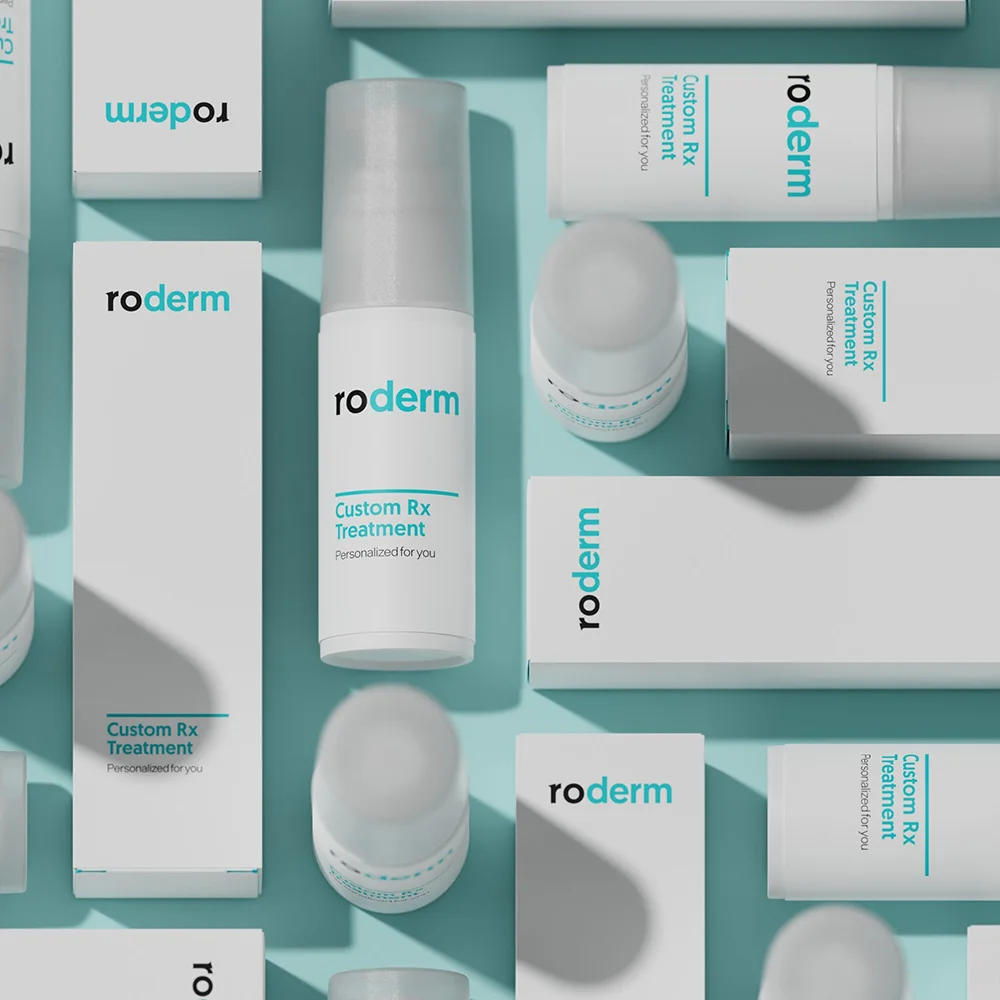Here's what we'll cover
Here's what we'll cover
Anyone who has chin acne or acne on other parts of the body knows that it can be a frustrating condition to live with. Acne lesions, often called “pimples,” can be inflamed, are often red, difficult to conceal, and are sometimes painful.
Fortunately, a wide range of self-care techniques and medical treatments may help you manage persistent chin pimples. Read on to learn more about chin acne, including what causes it and how to get rid of it.
What causes chin acne?
Acne is a common inflammatory skin condition, and it develops when your skin pores become clogged with dead skin cells and sebum (a natural moisturizer that keeps the hair follicle healthy and lubricates the skin).
This can lead to the development of whiteheads, blackheads, cysts, pustules, or nodules, better known as “pimples.” Sometimes, pimples can even become infected if accompanied by certain skin bacteria that feed on the dead skin cells, leading to inflammation (Sutaria, 2020).
A variety of factors can contribute to chin acne. Here are a few potential causes:
Hormones
Everyone has both male hormones (androgens) and female hormones. Simply put, androgens control your skin’s sebum production, and too much sebum leads to clogged pores. So, when androgens go up, they can stimulate increased oil production in the skin, making you more prone to developing acne.
This is also why you see teenagers with acne. During puberty, your body produces a lot of hormones, including androgens.
But hormone levels also change throughout adulthood, so chin acne is still possible even if you’re years past puberty. Both men and women can have hormonal acne, but it’s more common in women since most biological females go through monthly hormonal changes.
Some research suggests that hormonal acne often affects the chin and jawline, especially in females during the menstrual cycle, because the oil glands in these areas are very sensitive to hormone fluctuations. So if your acne mostly appears on your lower face or jawline, or if the acne comes at about the same time every month, you may have hormonal acne (Elsaie, 2016).
Additionally, some metabolic disorders can cause chin acne by affecting your hormone levels. For example, polycystic ovary syndrome (PCOS) causes people to produce more androgens, which can lead to acne.
Stress
Stress does not usually cause acne but may make it worse, especially if you have acne-prone skin.
Even short-term stress makes your cortisol levels increase, stimulating excess sebum production. And it’s not just psychological stress that causes your cortisol levels to rise. Pollution, smoking, lack of sleep, and a poor diet are all stressors that can increase your body’s cortisol levels (Passeron, 2021).
Cosmetics
Many beauty products, like some foundations and creams, can contain comedogenic (pore-clogging) ingredients that can irritate your skin and block your pores, increasing the risk for acne breakouts. If you have acne-prone skin, look for items that say non-comedogenic, non-acnegenic, and oil-free (Reszko, 2021).
How do you get rid of chin acne?
Just as there are different causes of chin acne, the best acne treatment can vary from person to person. Your chin pimples may respond to at-home or over-the-counter (OTC) topical treatments. But severe cases may require a prescription (Rx) medicine or the help of a healthcare professional or dermatologist (Kurokawa, 2020).
Ultimately, it may take trying a few different treatment options, and it will most likely take some time to see a lasting difference.
OTC chin acne treatments
Sometimes, all that’s needed to treat chin acne are over-the-counter topical treatments like creams, ointments, or gels that are applied to the skin to treat an acne outbreak or lower the risk of new outbreaks.
They work by reducing bacteria that cause acne and speeding up the shedding of dead skin cells. Some, like the following, also reduce inflammation and sebum production:
Topical treatments may be effective on their own or along with other products or prescription (Rx) medications.
Rx chin acne treatments
If over-the-counter treatments aren’t clearing your chin acne, your healthcare provider may recommend certain prescription acne medications, such as (Shutter, 2022; Farzam, 2022):
Oral antibiotics like doxycycline
Topical antibiotics like clindamycin
Isotretinoin (for severe acne)
In some cases, when a healthcare provider suspects hormones are the culprit behind a woman’s chin acne and her blood tests show high androgen levels, they may recommend hormonal therapy using oral contraceptives or a hormonal intrauterine device (IUD) (Elsaie, 2016).
Preventing chin pimples
Chin pimples are quite unpredictable, and there’s no fool-proof way to prevent adult acne. But there are some things you can do to help keep your skin clear and healthy, which can reduce the risk and frequency of acne outbreaks:
Be gentle to your skin: Aggressive skincare habits, like frequent washing or scrubbing, can dry out and irritate the skin making it more prone to inflammation and acne. Ideally, wash your face with a gentle cleanser when you wake up and before you go to bed (Thiboutot, 2021).
Reduce stress: Remember that stress can make your acne worse. Try engaging in certain stress management techniques like meditation, regular exercise, and deep breathing.
Quit smoking: Research shows that there is a link between smoking and developing acne (Mannocci, 2015). It can be hard to quit the habit alone, but fortunately, there are treatments available that your healthcare provider can recommend if you want to stop smoking.
Check product ingredient labels: Avoid purchasing products that contain irritating, pore-clogging ingredients. Instead, look for non-comedogenic cosmetic and skin care products.
Don’t touch your face: Try your best not to rest your hands on your chin and resist the urge to pick at or squeeze your pimples. You could spread bacteria, which may lead to more acne. Picking and popping pimples may also cause acne scarring.
When to see a healthcare provider
There are many effective chin acne treatments, and it is important to remember that no single treatment works for everyone. If you feel your skincare regimen or over-the-counter treatments aren’t stopping your chin acne breakouts, your healthcare provider may be able to recommend other options, like prescription acne medications, to help clear your skin.
And if your chin acne is causing you to feel embarrassed or depressed, reach out to a healthcare professional or therapist. Hope for a clearer chin may be closer than you think.
DISCLAIMER
If you have any medical questions or concerns, please talk to your healthcare provider. The articles on Health Guide are underpinned by peer-reviewed research and information drawn from medical societies and governmental agencies. However, they are not a substitute for professional medical advice, diagnosis, or treatment.
Elsaie, M. L. (2016). Hormonal treatment of acne vulgaris: An update. Clinical, Cosmetic and Investigational Dermatology, 9 , 241–248. doi:10.2147/CCID.S114830. Retrieved from https://www.dovepress.com/hormonal-treatment-of-acne-vulgaris-an-update-peer-reviewed-fulltext-article-CCID
Farzam, K., Nessel, T., & Quick, J. (2022). Erythromycin. StatPearls . Retrieved on May 21, 2022 from https://www.ncbi.nlm.nih.gov/books/NBK532249/
Kurokawa, I. & Nakase, K. (2020). Recent advances in understanding and managing acne. F1000Research, 9,
doi:10.12688/f1000research.25588.1. Retrieved from https://f1000research.com/articles/9-792/v1
Mannocci, A., Semyonov, L., Saulle, R., et al. (2015). Association between smoking habits and acne. A case-control study and a systematic review and meta-analysis. Epidemiology Biostatistics and Public Health, 12 (1). doi:10.2427/10987. Retrieved from https://iris.uniroma1.it/retrieve/handle/11573/899195/1457413/Mannocci_Association_2015.pdf
Passeron, T., Zouboulis, C. C., Tan, J., et al. (2021). Adult skin acute stress responses to short-term environmental and internal aggression from exposome factors. Journal of the European Academy of Dermatology and Venereology, 35 (10), 1963–1975. doi:10.1111/jdv.17432. Retrieved from https://onlinelibrary.wiley.com/doi/10.1111/jdv.17432
Reszko, A. & Berson, D. (2021). Postadolescent acne in women. UptoDate . Retrieved June 8, 2022 from https://www.uptodate.com/contents/postadolescent-acne-in-women
Shutter, M. C. & Akhondi, H. (2022). Tetracycline. StatPearls . Retrieved May 31, 2022 from https://www.ncbi.nlm.nih.gov/books/NBK549905/
Sutaria, A. H., Masood, S., & Schlessinger, J. (2020). Acne Vulgaris. StatPearls . Retrieved June 8, 2022 from https://www.ncbi.nlm.nih.gov/books/NBK459173/
Thiboutot, D. & Zaenglein, A. (2021). Pathogenesis, clinical manifestations, and diagnosis of acne vulgaris. UptoDate . Levy, M.L, Owen, C., and Ofori, A.O. (Eds.). Retrieved from https://www.uptodate.com/contents/pathogenesis-clinical-manifestations-and-diagnosis-of-acne-vulgaris










